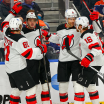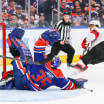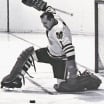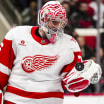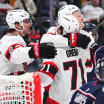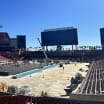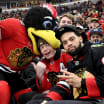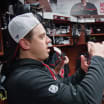Gionta overcame doubters on way to U.S. Hockey Hall of Fame
Success in NHL, on international stage answered questions about size
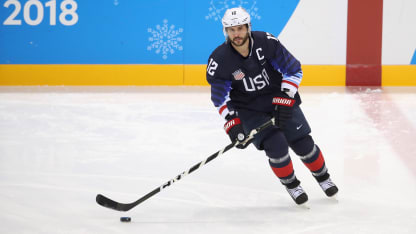
© Bruce Bennett/Getty Images
The 40-year-old had a similar reaction when he was informed that he'd been selected to be inducted into the U.S. Hockey Hall of Fame in Washington, D.C. on Thursday, joining NHL Commissioner Gary Bettman, NHL goalie Tim Thomas, two-time U.S. Olympian Krissy Wendell-Pohl and youth coach Neal Henderson.
"You grow up going to all the camps wishing to put on a USA jersey, so it was a huge honor every time," Gionta said. "I never took it for granted no matter when I could represent my country whether I was 15 years old or at the end in the Olympics. It still meant the same. It still gave you the same chills. So, the honor is a huge honor."
Wearing the USA jersey was a recurring event for Gionta, a forward who overcame questions about his size (5-foot-7, 178 pounds) to get 595 points (291 goals, 304 assists) in 1,026 games during 16 NHL seasons with the New Jersey Devils, Montreal Canadiens, Buffalo Sabres and Boston Bruins before he retired in 2018.
Gionta talks about joining the U.S. HHOF
Internationally, Gionta's experience spanned playing in the 1995 World Under-17 Hockey Challenge in Moncton, New Brunswick, when he was 15 to the 2018 Olympics when he was 39.
In between, the native of Rochester, New York, played in the 1998 and 1999 IIHF World Junior Championships, the 2000, 2001 and 2005 IIHF World Championships, and the 2006 Torino Olympics.
Gionta was sitting out and contemplating whether to play another NHL season when he got the call from coach Tony Granato and the late Jim Johannson, who was general manager of the 2018 Olympic team, asking him to be captain. After the NHL decided not to participate in those Olympics, Granato thought Gionta, with his experience as a captain with Boston College, the Canadiens and the Sabres, was the perfect guy to lead the United States team.
"We got not only a great leader, but really a guy that kind of exemplifies what USA Hockey is," Granato said. "He's just a guy who has been a great person. He's been an overachiever from a standpoint that as a small player he was able to accomplish what he did in the NHL, to go in a Canadian market and be the captain of the Canadiens, to be an international star.
"Whenever we asked him to be part of the USA program, he was there."
\\\
Though Brian Gionta identified with smaller NHL stars such as Pat Lafontaine (5-10, 182) and Theo Fleury (5-6, 182) when he was growing up, he became an in-house role model for his younger brother, Stephen Gionta (5-7, 177), when he started his hockey journey.
Prior to following Brian to Boston College, New Jersey and the NHL, where he played 301 games for the Devils and New York Islanders before retiring after last season, Stephen, now 36, would accompany his parents on trips to watch Brian at various USA Hockey camps and tournaments.
"I'd be dragged along in the car to Moncton [New Brunswick] or to Nelson, British Columbia, and watch him play for USA," Stephen Gionta said. "Even then, he was undersized at 14, 15, 16, and I was as well growing up. [Martin] St. Louis and Fleury, those guys along with Brian led the way for smaller-in-stature guys trying to prove that we can actually play the game if we're given the chance."
Brian Gionta never worried that he was too small.
"It was a knock against you and you either have to prove people wrong or work harder to change their initial opinion of you," he said.
There were times when Gionta was tested. Scott Gomez, who played with Gionta with New Jersey and Montreal, first witnessed this during a practice for the 1998 World Junior Championship when Gionta got into a heated battle with forward Ty Jones.
Like Gomez, Jones, selected No. 16 by the Chicago Blackhawks in the 1997 NHL Draft, grew up in Alaska and Gomez knew him well.
"He was as tough as it gets," Gomez said. "[Jones] and [Gionta] got into it on the ice and [Gionta] did not back down. … If Ty gets a hold of this kid, he's dead. But [Gionta] didn't back down one bit to the point where afterwards [the coaches] had to grab the two of them and bring them up in front of everyone to make up.
"It was funny because Ty Jones was 6-3, 6-4 and [Gionta] is what he is."
Gionta had countless confrontations with bigger opponents in the NHL, including some memorable ones with Bruins defenseman Zdeno Chara, who, at 6-9, is the tallest skater in League history.
"He played in an era where it was tough to get your ice. He had to compete," said Canadiens forward Brendan Gallagher (5-9, 184), who took inspiration from Gionta when he was younger. "He had to be ready to go up against bigger players, for sure. He was one of those guys that kind of proved smaller guys can have a career in this League."
\\\
At Boston College, Gionta helped the Eagles reach the Frozen Four in each of his four seasons, culminating with their second NCAA championship -- and first since 1949 -- as a senior in 2001. He remains Boston College's all-time leader in goals with 123 and is second in points with 232.
The school will retire his No. 12 jersey on Feb. 15.
"He kind of changed our whole culture here," said Boston College coach Jerry York, who was inducted into the Hockey Hall of Fame on Nov. 18.
Gionta began his pro career in 2001-02 with Albany, the American Hockey League affiliate of the Devils, who selected him in the third round (No. 82) of the 1998 NHL Draft. After being called up to make his NHL debut against the Edmonton Oilers on Dec. 30, 2001, Gionta initially played a checking role and skated on the third line with Jay Pandolfo and John Madden when New Jersey won the Stanley Cup in 2003.
He eventually grew into a scoring role and excelled on New Jersey's top line with Gomez and Patrik Elias, setting the Devils' single-season record with 48 goals in 2005-06. That was his second of seven-straight seasons with at least 20 goals.
"There's other years where I had a great pace, but you end up playing 60-65 games because of injury and the totals don't look the same," Gionta said. "But that year, it was just you felt good every night and every night you're contributing offensively and helping out that way."
After seven seasons with New Jersey, Gionta signed with Montreal as an unrestricted free agent on July 1, 2009. On Sept. 29, 2010, he was named the second U.S.-born captain in Canadiens history, following Chris Chelios, who was co-captain with Guy Carbonneau in 1989-90.
Gionta signed with Buffalo as an unrestricted free agent on July 1, 2014 and was again named captain. Although the Sabres didn't qualify for the Stanley Cup Playoffs during Gionta's three seasons with them, forward Jack Eichel, who succeeded Gionta as captain, said he learned a lot from him during that time.
"He's just such a great pro, somebody who comes in and takes care of business every day and leads by example," Eichel said. "It was an honor to get to play with him for a couple years and to be able to watch him and learn from him. His habits and the way he carries himself day in and day out, it's admirable."
Those qualities also served Gionta well as captain of the 2018 Olympic team.
"He wasn't even playing hockey at the time and you saw all of the hard work and preparation he put in just to get himself ready for that tournament," said Anaheim Ducks forward Troy Terry, who played on the 2018 Olympic team. "Especially being a young guy, I was only with him for a few weeks and he was a mentor to me, and he's someone I still talk to."
Although the U.S. lost to the Czech Republic in a shootout in the quarterfinals, the opportunity to wear the USA jersey a final time, and be captain, was special.
Gionta signed with the Bruins after the Olympics and played 20 regular-season games and one in the playoffs before retiring but considers his PyeongChang experience as "a great cap to my career."
Having never won a medal in international competition, Gionta lists a 5-2 victory against Canada in pool play during the 1998 IIHF World Junior Championship in Winnipeg as his best USA Hockey memory. Gionta had two goals and an assist in the win.
"But as far as team success, we never won, we never medaled," Gionta said. "So, those are things that still hang over my head."
NHL.com staff writer Amalie Benjamin contributed to this story.
